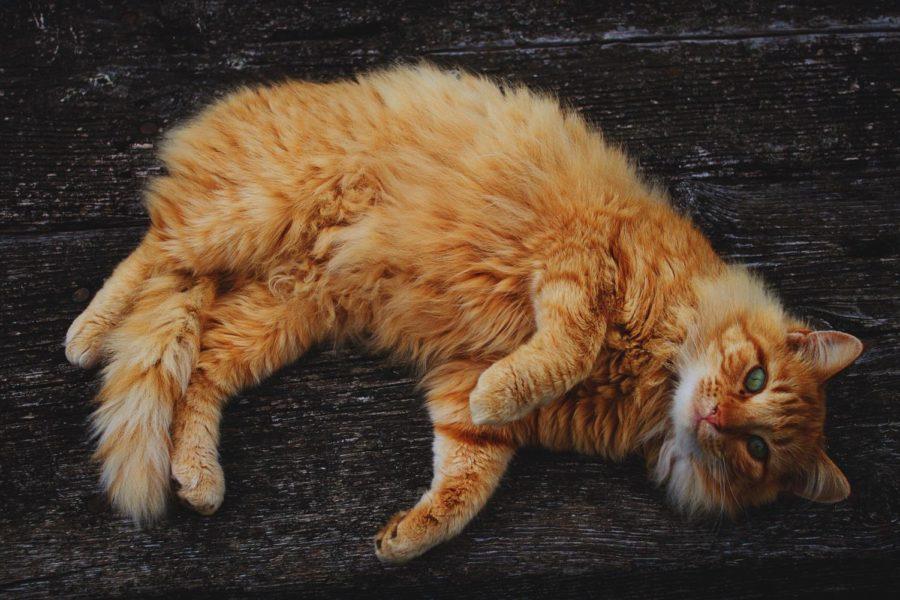Local club helps homeless cats
Homeless cat relaxing on a park bench, more tame than most feral cats. Unlike most feral cats that the club cares for, this one seems to be domesticated.
January 29, 2018
Scurrying into a storm drain on a blustery day or gazing down at a busy street from a cozy apartment window, cats wild and tame are often seen scattering cities and towns. Spotting a cat is a typical occurrence almost anywhere and no one usually thinks twice about it.
While it may not seem like a problem, cats are overpopulating hundreds of locations, especially in the countryside and small towns. According to the Iowa State Feral Cat Alliance, one female cat and her offspring could produce 420,000 cats in a span of seven years. Each litter produces, on average, five kittens — roughly 15 new cats a year.
For many towns throughout Iowa and the United States, there are different programs created to slow down the reproduction of cats in their area. In Ames, there are multiple organizations to help this issue. One of them helps contain the growing cat population right here at Iowa State University.
The Feral Cat Alliance (FCA) is an organization that is formulated by the students at Iowa State. It is completely volunteer-based and supported by students and veterinarians throughout Ames.
This club spays and neuters cats across Iowa. From the southern border of Minnesota to the northern border of Missouri, feral cats are brought to clinics. The clinics contain a room filled with medication for the cats along with tables to perform the surgery, provided by the FCA. At the clinics, the wild cats are spayed or neutered as well as treated with vaccinations and antibiotics to protect them from potential illnesses.
The FCA has a student-run executive board that organizes the clinics formulated for the cats. With two presidents and 24 members overall, the alliance is small, but works hard to achieve its goals.
“In 2017 we spayed and neutered 182 cats, and since 2002 we have spayed [or] neutered 3,246 cats,” said Danielle Kaitz, 27, cat coordinator and one of the presidents of the FCA.
The clinics provided by the club happen six times a year, and three times a semester. At a typical clinic, about 35 cats are spayed or neutered and vaccinated by the students with some certified veterinarians.
“There are six clinics a year. Four of them are normal, but there are two that we call ‘mega-clinics,’ with 60 cats and more professional vets,” said Christina Cicerchi, 28, and one of the presidents prior to Kaitz.
The veterinary volunteer students are grouped together to treat the cats. About four people are in a group with four or five cats that need to be altered. Each cat receives antibiotics and vaccinations along with a spay or neuter.
“They get a physical exam, blood drawn to determine if they are fit for surgery, vaccines and tested for FIV and FECV,” said Kristin Cairns, 24, and another president before Kaitz.
While most of the cats brought in are healthy, some arrive so malnourished that their ribs protrude underneath their loose skin.
“A lot of cats with fight wounds are brought in. We clean their wounds and then give them antibiotics with pain meds before releasing them in order to give them a better quality of life,” Cicerchi said.
All of the care that the cats receive costs $25 which, compared to most veterinary clinics, is an extremely low price. This low price encourages more people to bring in feral cats that roam around their area, therefore slowing down the reproduction of the felines.
“Being able to provide the service at a price that people are willing to pay really helps,” Kaitz said. “You can’t walk into any other clinic and get the same benefits for the same price.”
The clinics provided by the FCA are so popular that there is a waitlist with new names added to it often.
“It could be a year-long wait because people like it so much,” Kaitz said.
The students volunteering learn a great deal from this club and dedicate whole days to the cats.
“Our organization is all volunteer-based, and the students give up most of their Saturday to help the cats,” said Rachel Biddle, 24, and a president of the club.
While this organization benefits the community in one aspect by reducing the numbers of cats in the area, it helps the students as well by producing experience and allowing them to gain more knowledge.
“The nice thing about FCA is we are working to spay [or] neuter and give preventive medicine to all the cats across Iowa, while teaching vet students and helping them learn at the same time,” Cicerchi said.







